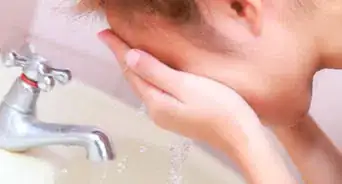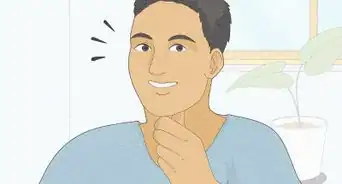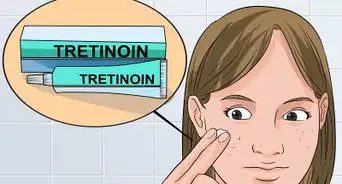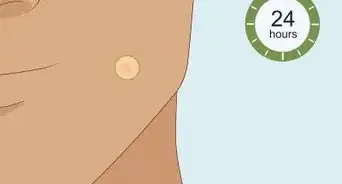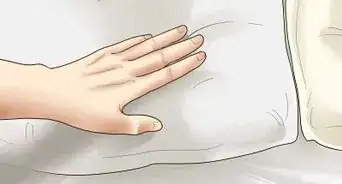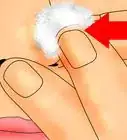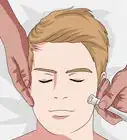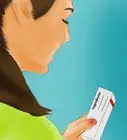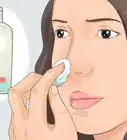This article was co-authored by Laura Marusinec, MD. Dr. Marusinec is a board certified Pediatrician at the Children's Hospital of Wisconsin, where she is on the Clinical Practice Council. She received her M.D. from the Medical College of Wisconsin School of Medicine in 1995 and completed her residency at the Medical College of Wisconsin in Pediatrics in 1998. She is a member of the American Medical Writers Association and the Society for Pediatric Urgent Care.
There are 11 references cited in this article, which can be found at the bottom of the page.
This article has been viewed 93,596 times.
If you’re a teenage girl, chances are that you have some acne on your face or other parts of your body such as your chest or back.[1] Acne is very common in teenage girls because changes in the body stimulate your glands to produce greater amounts of sebum, which can cause breakouts.[2] Whether you are suffering from mild or severe acne, pimples can cause any teenage girl stress during an especially sensitive and hormonal time in her life. By cleansing skin regularly and using the proper products to heal pimples, you can effectively treat acne as a teen girl.
Steps
Cleaning, Exfoliating, and Moisturizing Your Skin
-
1Cleanse your skin regularly. It’s important to wash your skin regularly to remove excess dirt and oil so that they don’t clog your pores. Regular, gentle cleansing can also help treat and prevent acne.[3]
- Use a gentle cleanser with a neutral pH,[4] such as Cetaphil, Aveeno, Eucerin, and Neutrogena.
- Most grocery stores and pharmacies carry skin cleansing products that won’t irritate your skin.
- If your skin is very oily, consider using an oil-free cleanser. Likewise, if your skin is dry, try using a glycerine or cream-based cleanser.[5]
- Don’t use bar soaps as their ingredients may clog pores.[6]
- Use lukewarm water to wash your skin. Water that is too hot can strip your skin of necessary oils and irritate it.[7]
-
2Avoid overwashing skin. Just as it’s important to wash your skin, it’s also important to not overwash it. Cleansing too often or too vigorously can irritate your skin, strip its oils, and lead to breakouts.[8]
- Washing acne-prone areas twice a day and after exercising or sweating is enough to help keep it clean and treat and prevent acne.[9]
Advertisement -
3Apply moisturizer daily. Use a skin-type specific moisturizer after you've washed your face. Having properly moisturized skin can help keep dead skin from clogging your pores and prevent acne.[10] Moisturizing your skin also reduces the redness, dryness, and flaking that many acne treatments can cause.
- Even if your skin is oily, it may need a moisturizer. Choose an oil-free and non-comedogenic product.[11]
- Talk to a dermatologist or skincare professional, who can help you figure out your skin type. You can buy products specifically formulated for your skin type and needs at most pharmacies and at many retailers, including department stores.[12]
-
4Exfoliate your skin regularly. Dead skin can clog pores and cause or make acne worse. Gently exfoliating your skin on a regular basis may help clear dead skin and bacteria and could cause acne.
- Be aware that an exfoliator will only remove surface skin and not penetrate deeply enough to scrub away pimples.[13]
- Choose a gentle exfoliator with either synthetic or natural beads that are a uniform shape. Harsh scrubs can irritate your skin and lead to further breakouts.[14] A soft washcloth can also gently exfoliate your skin.
-
5Use non-comedogenic and hypoallergenic products. If you use cosmetics or other types of skincare products such as moisturizer or sunscreen, choose non-comedogenic options. These won’t clog your pores and may help prevent further irritation.[15] Also look for makeup that is water-based or mineral-based and oil-free.
- Product marked “non-comedogenic” has been tested for acne-prone skin and won’t make existing acne worse or cause new pimples.[16]
- Any product marked “hypoallergenic” has been tested for sensitive skin and will not irritate your skin.
- There is a wide range of non-comedogenic and hypoallergenic products available including makeup, sunscreens, moisturizers, and toners. You can purchase them at most pharmacies, large department stores, online retailers, and even some grocery stores.
-
6Remove makeup before bed. Going to bed with makeup or cosmetic products on your skin can clog your pores. Remove all makeup or cosmetics with a gentle cleanser or a non-greasy make-up remover before you hit the pillow.[17]
- You can use a specific makeup remover, especially if you use waterproof products, or your gentle cleanser before bed. Most cleansers are effective at removing makeup.[18]
- Every month, you may want to consider cleaning your makeup applicators or cosmetic sponges with some soapy water to remove bacteria that can clog pores.[19]
-
7
-
8Keep your fingers and hands away from your face. You may be tempted to touch or pick at acne, but avoid the temptation to remove them this way. Picking at and touching your skin can spread oil and bacteria and may cause you to break out or could inflame existing acne.[22]
-
9Make healthy food choices. There is some evidence that a nutritionally well-balanced diet may help keep your skin clear.[25] Avoiding unhealthy and junk foods may help prevent blackheads and other kinds of acne.[26]
- Diets high in fat and sugar may slow cell turnover, resulting in more clogged pores.[27] Try and not eat too many fried foods or sweets.
- Foods high in vitamin A and beta-carotene, including fruits and vegetables such as raspberries and carrots, may increase cell turnover for healthier skin.[28]
- Yellow and orange fruits and vegetables are high in vitamin A and beta-carotene. These, combined with plenty of water, increase cell turnover resulting in healthy skin that is less prone acne.[29]
- Food high in essential fatty acids, such as walnuts or olive oil, may help skin cells stay hydrated.[30]
- Unhealthy foods also take the place of foods you could be eating that provide the necessary vitamins and antioxidants to promote healthy skin.
- Part of any well-balanced diet is proper hydration. Aim to drink at least eight cups of water every day to keep your body healthy, which may help your skin stay healthy.[31]
Applying Topical Acne Products and Taking Medication
-
1Wash your hands and your face. Before you begin any topical treatments to treat acne, clean your face and hands. This can help minimize the risk of spreading bacteria that could cause breakouts.[32]
- You can wash your hands with any soap and water, which is effective at removing bacteria.
- Wash your face with a gentle cleanser specifically designed for your facial skin. This includes products formulated for acne-prone skin. These cleansers may help stop the spread of bacteria and prevent additional breakouts.[33]
-
2Absorb excess oil. Excess sebum, or oil, can cause acne. If you have oily skin, use a topical product or mask to absorb excess oil. These products can not only help remove oil, but also keep bacteria and dead skin that cause acne at bay.[34]
- You can use an over the counter salicylic acid treatment or have your doctor prescribe one for more severe cases.[35]
- A weekly clay mask may help absorb excess oil and purify your skin.[36]
- You can use oil blotting papers to soak up excess oil on your face.[37]
- Be sure to follow your doctor’s or package directions to help ensure that you don’t overuse the product and further irritate your skin.
- You can purchase most oil-absorbing products at pharmacies or skincare stores as well as at some grocery stores. Online cosmetics retailers also offer oil-absorbing products.
-
3Spread benzoyl peroxide on your acne. Benzoyl peroxide is an anti-bacterial medication that can kill the bacteria that causes acne and reduce inflammation. It is available in most over-the-counter treatments for acne. Use this to help treat acne and prevent further breakouts.[38]
- You can get benzoyl peroxide over-the-counter in a 2.5%, 5%, or 10% solution. You want to use the most pure form available to combat acne. Ask a pharmacist if you have any questions about purchasing benzoyl peroxide, which is available at most pharmacies.[39]
- Start using the treatment slowly. Only apply a 2.5% or 5% gel or lotion once a day after you wash your face.[40]
- If you are not using other medications, increase the application to twice a day after a week.[41]
- You can use the 10% solution if your acne doesn’t improve in four to six weeks and if the 5% solution doesn't over-dry or irritate your skin.[42]
-
4See your doctor. You may find that over-the-counter topical treatments don’t help persistent or severe cases of acne. If these treatments don’t work after a few weeks, see your doctor or dermatologist. She may prescribe a stronger medication to treat your acne.[43]
- Your doctor may also offer special treatments for your acne such as chemical peels, microdermabrasion, or laser and light treatments.
-
5Use prescription medications. If your acne is severe, your doctor may prescribe an oral medication or topical cream. Creams and pills may help cure your acne and prevent further breakouts.[44]
-
6Administer a retinoid your to skin. Retinoids are topical vitamin A treatments your doctor can prescribe for severe acne. Administer it on your skin at night to help clear up and prevent acne and breakouts.[45]
- Most retinoids require a prescription, but there is one now available over-the-counter, called Differin gel (adapalene gel).
- Retinoids will make your skin sensitive to the sun, so make sure to apply extra sunscreen.[46]
- Retinoids may cause your skin to be irritated, red, and dry. They may also cause peeling,[47] though it is usually temporary and improves in a few weeks.
- Only apply retinoids at night.[48]
- It can take two to three months for retinoids to work, so make sure you stick with the program and follow your doctor’s advice.[49]
-
7Take antibiotics to kill acne bacteria. Take antibiotic pills, which can kill the bacteria that cause severe acne, including whiteheads. Antibiotics may also help decrease swelling and inflammation in severe acne.[50] Antibiotics are also often prescribed in a topical cream, even combined with benzoyl peroxide or retinoids. These can be used for longer than oral antibiotics.
-
8Try Accutane for extremely severe acne. If you have acne that won’t heal with other methods, consider taking Accutane. This very powerful medication is only used in cases of acne that doesn’t respond to other treatment or with severe cysts or scarring.[53]
- Accutane is available by prescription only and some doctors won’t prescribe it.[54] This is because it can cause a lot of dryness to your skin, lips, and eyes. It can also possibly increase your risk for depression and inflammatory bowel disease.
- Doctors require blood tests for patients before they prescribe Accutane because the medication can affect your blood cells, cholesterol, and liver.[55]
- Doctors also require women to prove that they are not pregnant and are taking or using two forms of birth control because Accutane can cause severe birth defects.[56]
-
9Obtain a prescription for birth control. Studies have shown that moderate to severe acne responds to taking birth control pills. Have your doctor prescribe you birth control pills if your acne doesn’t respond to other treatments and if birth control pills are the right fit for you.[57]
- The hormones present in most birth control pills can help keep acne from forming.[58]
- Be aware that it might take several months for birth control pills to help your acne.[59]
- You need a prescription to get birth control pills, and some doctors or pharmacies may require parental consent if you are under 18. Birth control can increase your risk for blood clots, so your doctor will talk to about any risks you may have. Also, your doctor will tell you not to smoke if you are taking birth control pills.
Expert Q&A
-
QuestionIf you take birth control pills to get healthy skin, and find after using it for several years that it worked, will acne reappear if you stop taking the pill?
 Laura Marusinec, MDDr. Marusinec is a board certified Pediatrician at the Children's Hospital of Wisconsin, where she is on the Clinical Practice Council. She received her M.D. from the Medical College of Wisconsin School of Medicine in 1995 and completed her residency at the Medical College of Wisconsin in Pediatrics in 1998. She is a member of the American Medical Writers Association and the Society for Pediatric Urgent Care.
Laura Marusinec, MDDr. Marusinec is a board certified Pediatrician at the Children's Hospital of Wisconsin, where she is on the Clinical Practice Council. She received her M.D. from the Medical College of Wisconsin School of Medicine in 1995 and completed her residency at the Medical College of Wisconsin in Pediatrics in 1998. She is a member of the American Medical Writers Association and the Society for Pediatric Urgent Care.
Board Certified Pediatrician Sometimes. It may depend on your age, as you are more likely to have acne when you are in your teens or early 20's. Talk to your doctor if you decide to stop the pill to see what you can do to prevent acne from returning.
Sometimes. It may depend on your age, as you are more likely to have acne when you are in your teens or early 20's. Talk to your doctor if you decide to stop the pill to see what you can do to prevent acne from returning. -
QuestionWould it be okay to use antibiotics or pills as a teenager? Won't they be harmful?
 Laura Marusinec, MDDr. Marusinec is a board certified Pediatrician at the Children's Hospital of Wisconsin, where she is on the Clinical Practice Council. She received her M.D. from the Medical College of Wisconsin School of Medicine in 1995 and completed her residency at the Medical College of Wisconsin in Pediatrics in 1998. She is a member of the American Medical Writers Association and the Society for Pediatric Urgent Care.
Laura Marusinec, MDDr. Marusinec is a board certified Pediatrician at the Children's Hospital of Wisconsin, where she is on the Clinical Practice Council. She received her M.D. from the Medical College of Wisconsin School of Medicine in 1995 and completed her residency at the Medical College of Wisconsin in Pediatrics in 1998. She is a member of the American Medical Writers Association and the Society for Pediatric Urgent Care.
Board Certified Pediatrician Most doctors try to use only the antibiotics that the person really needs. Once you are doing better, they will try to stop the antibiotics. They will then use other treatments such as creams, light treatments or lasers, or hormonal treatments to get you off of antibiotics. Taking antibiotics long-term can lead to problems in some people.
Most doctors try to use only the antibiotics that the person really needs. Once you are doing better, they will try to stop the antibiotics. They will then use other treatments such as creams, light treatments or lasers, or hormonal treatments to get you off of antibiotics. Taking antibiotics long-term can lead to problems in some people.
References
- ↑ http://kidshealth.org/teen/your_body/skin_stuff/acne.html
- ↑ http://kidshealth.org/teen/your_body/skin_stuff/acne.html
- ↑ http://www.pamf.org/teen/health/skin/acne-howtotreat.html
- ↑ http://www.pamf.org/teen/health/skin/acne-howtotreat.html
- ↑ http://www.pamf.org/teen/health/skin/acne-howtotreat.html
- ↑ http://www.paulaschoice.com/expert-advice/acne/_/blackheads#cause
- ↑ http://www.mayoclinic.org/diseases-conditions/acne/basics/prevention/con-20020580
- ↑ http://www.pamf.org/teen/health/skin/acne-howtotreat.html
- ↑ http://www.pamf.org/teen/health/skin/acne-howtotreat.html
- ↑ http://www.pamf.org/teen/health/skin/acne-howtotreat.html
- ↑ http://www.pamf.org/teen/health/skin/acne-howtotreat.html
- ↑ http://www.pamf.org/teen/health/skin/acne-howtotreat.html
- ↑ http://www.pamf.org/teen/health/skin/acne-howtotreat.html
- ↑ http://www.pamf.org/teen/health/skin/acne-howtotreat.html
- ↑ http://www.mayoclinic.org/diseases-conditions/acne/basics/prevention/con-20020580
- ↑ http://www.mayoclinic.org/diseases-conditions/acne/basics/prevention/con-20020580
- ↑ http://www.mayoclinic.org/diseases-conditions/acne/basics/prevention/con-20020580
- ↑ http://www.paulaschoice.com/expert-advice/acne/_/blackheads#cause
- ↑ http://www.mayoclinic.org/diseases-conditions/acne/basics/prevention/con-20020580
- ↑ http://www.mayoclinic.org/diseases-conditions/acne/basics/prevention/con-20020580
- ↑ http://www.mayoclinic.org/diseases-conditions/acne/basics/prevention/con-20020580
- ↑ http://www.mayoclinic.org/diseases-conditions/acne/basics/prevention/con-20020580
- ↑ http://www.mayoclinic.org/diseases-conditions/acne/basics/prevention/con-20020580
- ↑ http://kidshealth.org/teen/your_body/skin_stuff/acne.html#a_What_Can_I_Do_About_Acne_
- ↑ http://kidshealth.org/teen/your_body/skin_stuff/acne.html#a_What_Is_Acne_and_What_Causes_It_
- ↑ http://kidshealth.org/teen/your_body/skin_stuff/acne.html#a_What_Is_Acne_and_What_Causes_It_
- ↑ http://www.realsimple.com/beauty-fashion/skincare/does-drinking-water-hydrate-skin
- ↑ http://www.realsimple.com/beauty-fashion/skincare/does-drinking-water-hydrate-skin
- ↑ http://www.realsimple.com/beauty-fashion/skincare/does-drinking-water-hydrate-skin
- ↑ http://www.realsimple.com/beauty-fashion/skincare/does-drinking-water-hydrate-skin
- ↑ http://www.realsimple.com/beauty-fashion/skincare/does-drinking-water-hydrate-skin
- ↑ http://www.mayoclinic.org/diseases-conditions/acne/basics/lifestyle-home-remedies/con-20020580
- ↑ http://www.mayoclinic.org/diseases-conditions/acne/basics/lifestyle-home-remedies/con-20020580
- ↑ http://www.mayoclinic.org/diseases-conditions/acne/basics/prevention/con-20020580
- ↑ http://www.mayoclinic.org/diseases-conditions/acne/basics/prevention/con-20020580
- ↑ http://kidshealth.org/teen/your_body/skin_stuff/acne.html#a_What_Can_I_Do_About_Acne_
- ↑ http://kidshealth.org/teen/your_body/skin_stuff/acne.html#a_What_Can_I_Do_About_Acne_
- ↑ http://www.pamf.org/teen/health/skin/acne-howtotreat.html
- ↑ http://www.pamf.org/teen/health/skin/acne-howtotreat.html
- ↑ http://www.pamf.org/teen/health/skin/acne-howtotreat.html
- ↑ http://www.pamf.org/teen/health/skin/acne-howtotreat.html
- ↑ http://www.pamf.org/teen/health/skin/acne-howtotreat.html
- ↑ http://www.pamf.org/teen/health/skin/acne-howtotreat.html
- ↑ http://www.pamf.org/teen/health/skin/acne-howtotreat.html
- ↑ http://www.pamf.org/teen/health/skin/acne-howtotreat.html
- ↑ http://www.pamf.org/teen/health/skin/acne-howtotreat.html
- ↑ http://www.pamf.org/teen/health/skin/acne-howtotreat.html
- ↑ http://www.pamf.org/teen/health/skin/acne-howtotreat.html
- ↑ http://www.pamf.org/teen/health/skin/acne-howtotreat.html
- ↑ http://www.pamf.org/teen/health/skin/acne-howtotreat.html
- ↑ http://www.pamf.org/teen/health/skin/acne-howtotreat.html
- ↑ http://www.pamf.org/teen/health/skin/acne-howtotreat.html
- ↑ http://www.pamf.org/teen/health/skin/acne-howtotreat.html
- ↑ http://www.pamf.org/teen/health/skin/acne-howtotreat.html
- ↑ http://www.pamf.org/teen/health/skin/acne-howtotreat.html
- ↑ http://www.pamf.org/teen/health/skin/acne-howtotreat.html
- ↑ http://youngwomenshealth.org/parents/birth-control-pills-parent/
- ↑ http://youngwomenshealth.org/parents/birth-control-pills-parent/
- ↑ http://youngwomenshealth.org/parents/birth-control-pills-parent/
About This Article
Don’t worry if you’ve got pesky acne because there are tons of ways to reduce or even get rid of it. For smoother, clearer skin, wash your skin regularly with a gentle cleanser to remove excess dirt and oil so they don’t clog your pores. In addition to washing your skin, exfoliate it regularly to clear out dead skin cells, which can also clog pores and make acne worse. However, be careful not to wash your face too often or too vigorously as this can irritate your skin, strip its oils, and lead to more breakouts. To keep your skin hydrated, use a moisturizer daily, even if your skin is oily. Moisturizing your skin reduces the redness, dryness, and flaking that many acne treatments can cause. For more tips from our Medical co-author, like how to treat acne with prescription medication, keep reading!
-Step-1.webp)
-Step-2.webp)
-Step-3.webp)
-Step-4.webp)
-Step-5.webp)
-Step-6.webp)
-Step-7.webp)
-Step-8.webp)
-Step-9.webp)
-Step-10.webp)
-Step-11.webp)
-Step-12.webp)
-Step-13.webp)
-Step-14.webp)
-Step-15.webp)
-Step-16.webp)
-Step-17.webp)
-Step-18.webp)

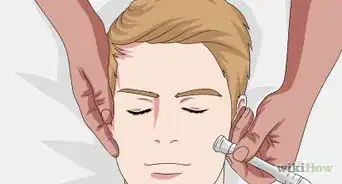

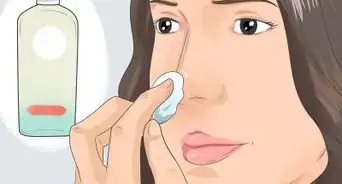
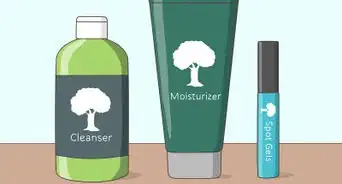
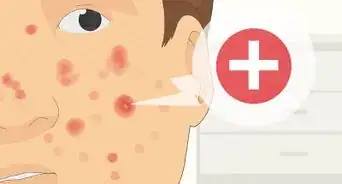
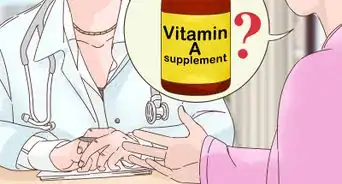
-Step-8-Version-2.webp)
